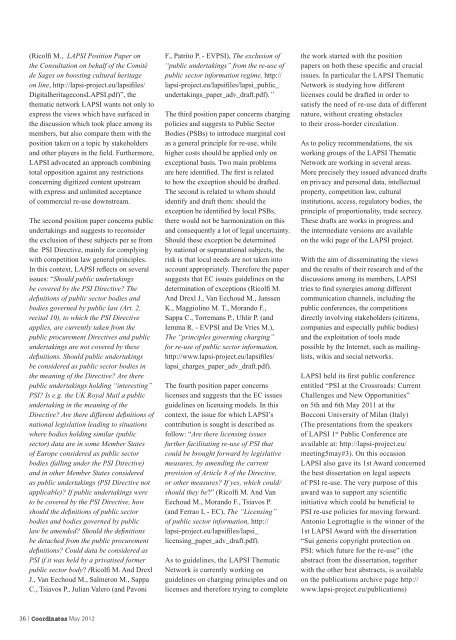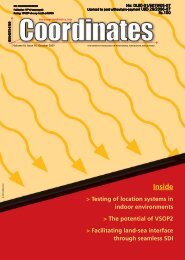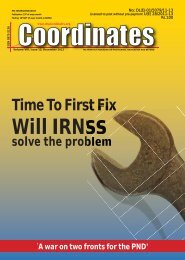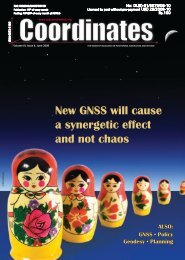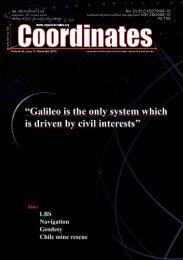Download - Coordinates
Download - Coordinates
Download - Coordinates
Create successful ePaper yourself
Turn your PDF publications into a flip-book with our unique Google optimized e-Paper software.
(Ricol M., LAPSI Position Paper on<br />
the Consultation on behalf of the Comité<br />
de Sages on boosting cultural heritage<br />
on line, http://lapsi-project.eu/lapsi les/<br />
DigitalheritageconsLAPSI.pdf)”, the<br />
thematic network LAPSI wants not only to<br />
express the views which have surfaced in<br />
the discussion which took place among its<br />
members, but also compare them with the<br />
position taken on a topic by stakeholders<br />
and other players in the eld. Furthermore,<br />
LAPSI advocated an approach combining<br />
total opposition against any restrictions<br />
concerning digitized content upstream<br />
with express and unlimited acceptance<br />
of commercial re-use downstream.<br />
The second position paper concerns public<br />
undertakings and suggests to reconsider<br />
the exclusion of these subjects per se from<br />
the PSI Directive, mainly for complying<br />
with competition law general principles.<br />
In this context, LAPSI re ects on several<br />
issues: “Should public undertakings<br />
be covered by the PSI Directive? The<br />
defi nitions of public sector bodies and<br />
bodies governed by public law (Art. 2,<br />
recital 10), to which the PSI Directive<br />
applies, are currently taken from the<br />
public procurement Directives and public<br />
undertakings are not covered by these<br />
defi nitions. Should public undertakings<br />
be considered as public sector bodies in<br />
the meaning of the Directive? Are there<br />
public undertakings holding “interesting”<br />
PSI? Is e.g. the UK Royal Mail a public<br />
undertaking in the meaning of the<br />
Directive? Are there different defi nitions of<br />
national legislation leading to situations<br />
where bodies holding similar (public<br />
sector) data are in some Member States<br />
of Europe considered as public sector<br />
bodies (falling under the PSI Directive)<br />
and in other Member States considered<br />
as public undertakings (PSI Directive not<br />
applicable)? If public undertakings were<br />
to be covered by the PSI Directive, how<br />
should the defi nitions of public sector<br />
bodies and bodies governed by public<br />
law be amended? Should the defi nitions<br />
be detached from the public procurement<br />
defi nitions? Could data be considered as<br />
PSI if it was held by a privatised former<br />
public sector body? (Ricol M. And Drexl<br />
J., Van Eechoud M., Salmeron M., Sappa<br />
C., Tsiavos P., Julian Valero (and Pavoni<br />
36 | <strong>Coordinates</strong> May 2012<br />
F., Patrito P. - EVPSI), The exclusion of<br />
“public undertakings” from the re-use of<br />
public sector information regime, http://<br />
lapsi-project.eu/lapsi les/lapsi_public_<br />
undertakings_paper_adv_draft.pdf).”<br />
The third position paper concerns charging<br />
policies and suggests to Public Sector<br />
Bodies (PSBs) to introduce marginal cost<br />
as a general principle for re-use, while<br />
higher costs should be applied only on<br />
exceptional basis. Two main problems<br />
are here identi ed. The rst is related<br />
to how the exception should be drafted.<br />
The second is related to whom should<br />
identify and draft them: should the<br />
exception be identi ed by local PSBs,<br />
there would not be harmonization on this<br />
and consequently a lot of legal uncertainty.<br />
Should these exception be determined<br />
by national or supranational subjects, the<br />
risk is that local needs are not taken into<br />
account appropriately. Therefore the paper<br />
suggests that EC issues guidelines on the<br />
determination of exceptions (Ricol M.<br />
And Drexl J., Van Eechoud M., Janssen<br />
K., Maggiolino M. T., Morando F.,<br />
Sappa C., Torremans P., Uhlir P. (and<br />
Iemma R. - EVPSI and De Vries M.),<br />
The “principles governing charging”<br />
for re-use of public sector information,<br />
http://www.lapsi-project.eu/lapsi les/<br />
lapsi_charges_paper_adv_draft.pdf).<br />
The fourth position paper concerns<br />
licenses and suggests that the EC issues<br />
guidelines on licensing models. In this<br />
context, the issue for which LAPSI’s<br />
contribution is sought is described as<br />
follow: “Are there licensing issues<br />
further facilitating re-use of PSI that<br />
could be brought forward by legislative<br />
measures, by amending the current<br />
provision of Article 8 of the Directive,<br />
or other measures? If yes, which could/<br />
should they be?” (Ricol M. And Van<br />
Eechoud M., Morando F., Tsiavos P.<br />
(and Ferrao L - EC), The “Licensing”<br />
of public sector information, http://<br />
lapsi-project.eu/lapsi les/lapsi_<br />
licensing_paper_adv_draft.pdf).<br />
As to guidelines, the LAPSI Thematic<br />
Network is currently working on<br />
guidelines on charging principles and on<br />
licenses and therefore trying to complete<br />
the work started with the position<br />
papers on both these speci c and crucial<br />
issues. In particular the LAPSI Thematic<br />
Network is studying how different<br />
licenses could be drafted in order to<br />
satisfy the need of re-use data of different<br />
nature, without creating obstacles<br />
to their cross-border circulation.<br />
As to policy recommendations, the six<br />
working groups of the LAPSI Thematic<br />
Network are working in several areas.<br />
More precisely they issued advanced drafts<br />
on privacy and personal data, intellectual<br />
property, competition law, cultural<br />
institutions, access, regulatory bodies, the<br />
principle of proportionality, trade secrecy.<br />
These drafts are works in progress and<br />
the intermediate versions are available<br />
on the wiki page of the LAPSI project.<br />
With the aim of disseminating the views<br />
and the results of their research and of the<br />
discussions among its members, LAPSI<br />
tries to nd synergies among different<br />
communication channels, including the<br />
public conferences, the competitions<br />
directly involving stakeholders (citizens,<br />
companies and especially public bodies)<br />
and the exploitation of tools made<br />
possible by the Internet, such as mailinglists,<br />
wikis and social networks.<br />
LAPSI held its rst public conference<br />
entitled “PSI at the Crossroads: Current<br />
Challenges and New Opportunities”<br />
on 5th and 6th May 2011 at the<br />
Bocconi University of Milan (Italy)<br />
(The presentations from the speakers<br />
of LAPSI 1 st Public Conference are<br />
available at: http://lapsi-project.eu/<br />
meeting5may#3). On this occasion<br />
LAPSI also gave its 1st Award concerned<br />
the best dissertation on legal aspects<br />
of PSI re-use. The very purpose of this<br />
award was to support any scienti c<br />
initiative which could be bene cial to<br />
PSI re-use policies for moving forward.<br />
Antonio Legrottaglie is the winner of the<br />
1st LAPSI Award with the dissertation<br />
“Sui generis copyright protection on<br />
PSI: which future for the re-use” (the<br />
abstract from the dissertation, together<br />
with the other best abstracts, is available<br />
on the publications archive page http://<br />
www.lapsi-project.eu/publications)


